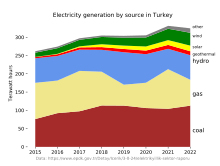Natural gas in Turkey

Turkey consumes about 60 billion cubic metres of natural gas each year,[1] which supplies over a quarter of Turkey's primary energy.[2]
Production[]
As of 2022, almost all natural gas consumed by Turkey is imported, but production from the Sakarya gas field in the Black Sea is planned[3] to start in 2023 and provide almost a third of national demand.[4]
Imports[]
In 2021 a third of the 48 bcm consumed came from Russia,[5] but one long-term contract expired at the end of 2021 and the other ends in 2025.[6] BOTAŞ would like to import from Northern Iraq but completing the Iraqi part of the pipeline is mired in disputes between the KRG and Iraq central government.[7] Turkey suspects winter cuts in long-term (to 2026[8]) contracted supply from Iran are not faults but Iran keeping the gas for its own use, especially when the market price is high.[7]
Transmission and storage[]
There are many gas pipelines with plenty of spare capacity.[9] However, gas imports cost $12 and $15 billion per year (and the lira is weak);[10] they are a significant part of the import bill. A cheaper supply from Turkmenistan has been planned for decades,[11] but a pipeline under the Caspian Sea has not yet been built[12] partly due to lack of an agreement between Turkmenistan and Azerbaijan.[13] Liquefied natural gas (LNG) is imported from several countries including Egypt, Algeria and the United States.[9] In 2021 there was about 5 billion cubic metres (bcm) of storage which is planned to reach 11 bcm by 2023.[14]
Consumption[]

About a quarter of gas is used by industry and a quarter by households.[2]: 139 About half of residential energy demand is met by gas.[2]: 139 Electricity generation in Turkey varies greatly depending on whether there is enough rain to produce hydroelectricity; therefore, when it rains, Turkey burns less gas.[2]: 139 The International Energy Agency predicted in 2021 that use for electricity generation will decline.[2]: 140 According to the government the price of gas for Turkish households was the lowest in Europe in late 2021.[15] Prices for industry and power plants are more than double the household price.[15]
Economics[]
Gas imports deplete foreign exchange reserves[16] and some analysts say that imported oil and gas is a key weakness in the economy of Turkey.[17] The country would like to become a hub to supply the EU.[18]
Geopolitics[]
Turkey opposes some gas exploration by the Republic of Cyprus because of the Cyprus–Turkey maritime zones dispute.[19]
See also[]
- Natural gas pipelines in Turkey
- Durusu gas field
- Sakarya gas field
References[]
- ^ "A Cold Winter: Turkey and the Global Natural Gas Shortage". Edam. 2021-10-06. Archived from the original on 2021-12-17. Retrieved 2021-12-19.
- ^ a b c d e IEA (March 2021). Turkey 2021 – Energy Policy Review (Technical report). International Energy Agency. Archived from the original on 2022-03-07. Retrieved 2021-12-19.
- ^ "Republic of Turkey Ministry of Energy and Natural Resources - Natural Gas". enerji.gov.tr. Archived from the original on 2021-12-19. Retrieved 2021-12-19.
- ^ "Turkey's Black Sea gas find to raise output to 25% of EU capacity". www.worldoil.com. Archived from the original on 2021-12-19. Retrieved 2021-12-19.
- ^ "Russia-Ukraine war: How will it affect Turkey's economy?". Archived from the original on 2022-02-25. Retrieved 2022-03-04.
- ^ Reuters (2022-02-25). "Factbox: Turkey's ties to Russia, Ukraine limit its room to manoeuvre". Reuters. Retrieved 2022-03-24.
- ^ a b "Iraqi Kurdish gas to Turkey? Easier said than done". Middle East Eye. Archived from the original on 2022-03-13. Retrieved 2022-03-09.
- ^ "Iran has a long way to go to export natural gas to Europe". Middle East Monitor. 2022-03-22. Retrieved 2022-03-24.
- ^ a b Elliott, Stuart; O'Byrne, David (2021-12-09). "Egypt emerges as key LNG supplier to Turkey in Q4". www.spglobal.com. Archived from the original on 2021-12-19. Retrieved 2021-12-19.
- ^ "Regional Solutions to Regional Challenges in the Middle East?". Moshe Dayan Center for Middle Eastern and African Studies. Archived from the original on 2021-12-19. Retrieved 2021-12-19.
- ^ "Republic of Turkey Ministry of Energy and Natural Resources - Natural Gas Pipelines and Projects". enerji.gov.tr. Archived from the original on 2021-12-19. Retrieved 2021-12-19.
- ^ "New American company seeks to realize Trans-Caspian pipe dream | Eurasianet". eurasianet.org. Archived from the original on 2021-12-19. Retrieved 2021-12-19.
- ^ "No magic tap for Europe to replace Russian gas via Turkey". Al-Monitor. Retrieved 2022-03-24.
- ^ "Gas storage capacity to hit 11 bln cubic meters by 2023 - Latest News". Hürriyet Daily News. Archived from the original on 2021-12-26. Retrieved 2021-12-26.
- ^ a b "Botaş hikes natural gas prices 20 pct - Latest News". Hürriyet Daily News. Archived from the original on 2021-12-19. Retrieved 2021-12-19.
- ^ "Turkey strikes energy milestone as wind power output surges". Turkey strikes energy milestone as wind power output surges. Archived from the original on 2021-12-19. Retrieved 2021-12-19.
- ^ Wallace, Joe (2021-11-29). "Turkey's Lira Crisis Exposes Reliance on Imported Energy". Wall Street Journal. ISSN 0099-9660. Archived from the original on 2021-12-19. Retrieved 2021-12-19.
- ^ "Can Turkey benefit from Europe's quest to reduce Russian gas? - Al-Monitor: The Pulse of the Middle East". www.al-monitor.com. Archived from the original on 2022-03-09. Retrieved 2022-03-09.
- ^ "ExxonMobil, Qatar sign Cyprus gas deal despite Turkey opposition". France 24. 2021-12-10. Archived from the original on 2021-12-19. Retrieved 2021-12-19.
External links[]
- Natural gas in Turkey
- Climate change in Turkey